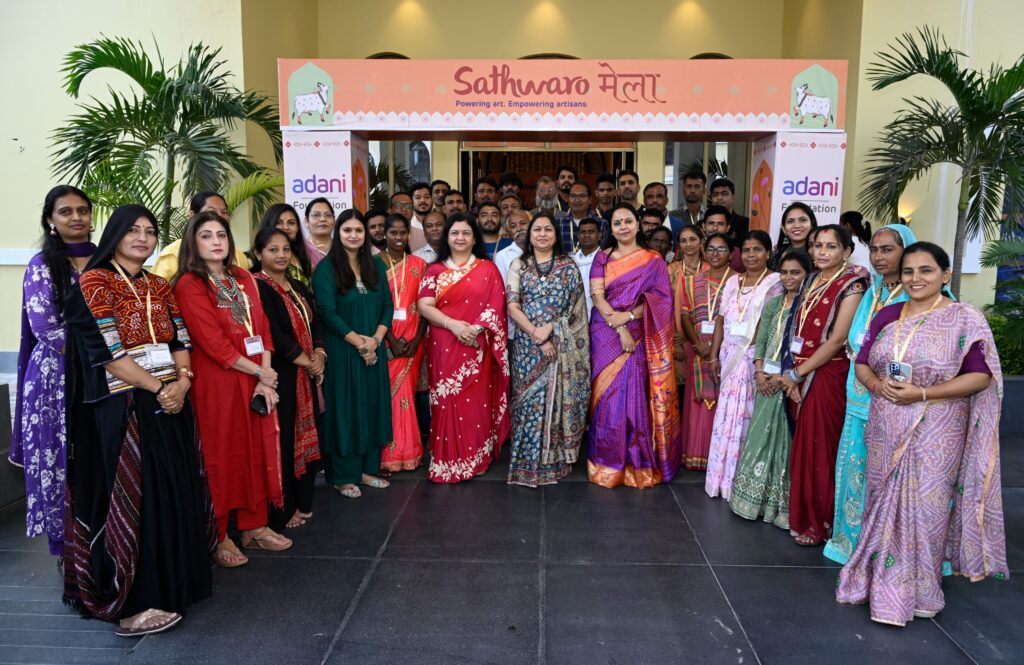Ahmedabad: The Adani Foundation organized the second edition of Sathwaro Melafrom 14-15 September 2024 at Belvedere Golf & Country Club in Adani Shantigram, Ahmedabad, showcasing India’s diverse arts and crafts. The event featured an inspiring array of handmade products made by self-help groups (SHGs) and artisans from across the country. With a focus on empowering artisans and preserving cultural heritage, the event bridges the gap between artisans and consumers. Through this platform, the Foundation aims to promote sustainable livelihoods and economic growth.

From the upscale Chanderi and Patola saris, the intricate Soonf embroidery cloth pieces, Pattachitra and stone dust paintings,to affordable macrame handwoven bags and home décor items, the unique nail craft, brasswares, terracotta artworks, oxidized and bead jewellery, the exhibition received an overwhelming response from the visitors, who had so many traditional and contemporary crafts – each narrating a story of India’s cultural richness – to choose from and purchase.
The added attraction here were the stalls of some rare artworks on display – Sujani handwoven linen (an exclusive art form carried forward by one and only family in India over generations), Sadeli handicraft, and the traditional Rogan art of Gujarat (both often referred to as dying crafts).With over 140 artisans attached to the Sathwaro, the two-day exhibition saw a coming together of over 80 artists – a mix of both independent artisans and Self Help Groups from different corners of India.The two-day event did a valuable business of over Rs 30,00,000 and created awareness about arts (including some of dying art forms) among visitors, including Adani Group employees and their families. Over 80 artisans from 10 states put up 43 stalls at the Mela, which saw a footfall of over 3,000 people.
JasodabenKotwadiya, an artisan from the tribal Kotwadiya community in Umarpada who put up a stall of items made of straw, beamed with happiness when she said, “We did not know that our work is a form of art. The straw baskets and wall hangings that we earlier sold to middlemen in bulk for Rs 20 each fetched us a good price at the Mela. The Adani Foundation has helped women like us tremendously by bridging this gap between buyers and sellers. They guided us and gave us a platform where we can stand at exhibitions like these and sell our products to earn a decent living.”
Due to lack of finances and support, artisans often struggle to market their products, forcing them to sell these at much cheaper prices to middlemen. The Foundation reaches out to such artists in far-flung villages to help them find a suitable and sustainable model of livelihood. While honing the talents of artists is one goal, the Foundation has also been actively adopting villages, where the women are counseled on the importance of being financially independent, trained in different skill sets, and encouraged to be part of self-help groups.
Om Prakash Maharana, a Pattachitra artist from Jagannath Puri, Odisha, was a satisfied man after selling his product at a good price. “I sold one of my most expensive paintings worth Rs 60,000 here. It’s our first association with the Adani Foundation and we are so glad that they are reaching out to artists like us to help us reach our customers.”SurajOmre, a stone dust artist from Faridabad, shared, “I brought two big wall hangings for this exhibition along with other small frames. Imanaged to sell my biggest and exclusive wall hanging at Rs 55,000.”
“Sathwaro is one of the youngest initiatives of the Adani Foundation. We are extremely happy to have organized the second edition of Sathwaro Mela,which saw the participation of more than 80 artisans,” said Dr Priti Adani, Chairperson, Adani Foundation. “The objective behind this initiative is to promote, encourage, and revive the dying art and crafts of India. I am happy to see that our artisan community is becoming more creative and market oriented. They are proactively approaching us to promote their work. Every art has its own unique identity, and an artist goes through a lot of pain and thought process to keep it active and alive. Through Sathwaro, we are contributing to the revival of art and cultural heritage, both of which have a long history of hard work and sacrifices behind them.”

